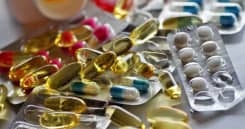Attention Deficit Hyperactivity Disorder, or ADHD, is a common challenge faced by kids trying to get through school, and adults trying to get through another day, and while we associate ADHD with children, it’s a condition that continues into adulthood.
The outward symptoms may change as we age but the underlying condition continues to show itself in many ways – ways that limit the quality of life.
You can’t get organized. You’re running late – again. There’s not enough time in the day. You don’t remember your manager’s directions.
Signs of Adult ADHD
ADHD isn’t something we grow out of as we get older. However, instead of staring blankly out a classroom window you stare blankly out your office window. You weren’t accomplishing anything back then, and you aren’t accomplishing anything now.
Get Your Life in Focus
ADHD in adults manifests itself in a variety of ways:
• Do you have trouble getting simple activities (like family dinner) organized?
• Are you impatient once you get behind the wheel?
• Do you have problems in your marriage or other close relationships?
• Do you listen, or have you drifted off already?
• Is it hard to relax without a drink or a few tokes?
• Do you have trouble starting a project because you don’t know where to begin?
• Are you always the last one to arrive?
• Do you get angry for no specific reason?
• Can you create a list of activities by priority, i.e. what must
come first, second, and so on?
These are just a few of the symptoms in adults with ADHD, but if they sound familiar, well, you might want to take action to make your life better.

To learn about substance abuse and how our treatment programs in Hawaii can help with ADHD and co-occurring disorders.
More infoADHD and Substance Abuse
Life is hard for adults with ADHD, and many of us don’t even realize that our “carelessness” or “forgetfulness” are symptoms of Attention Deficit Hyperactivity Disorder. We hide the disorder from others, and sometimes from ourselves
ADHD is sometimes associated with depression, or sometimes adults with ADHD experience anxiety attacks at inappropriate times – times when there is no evident danger. Emotions are bubbling just below the surface – and you don’t know why!
Today, our schools may identify students with ADHD. The symptoms are overt and more clearly identified. However, in adulthood, we’ve learned adaptive behaviors to hide our lack of attention. We nod knowingly when a co-worker has a problem, or we force a smile when we really feel like shouting in anger. As adults, we understand acceptable behavior. However, the underlying cause of these adaptive behaviors is still the same whether you’re six or sixty.
Each day is a struggle. You have to pretend to be someone you’re not. You don’t find joy in the simple things. Everything turns into the “drama” of the day.
You argue with co-workers. You forget promises. You fail to finish that report. Whether you’re a kid or a senior citizen ADHD is likely to cause emotional pain.
That’s why adults who experience Attention Deficit Hyperactivity Disorder often turn to illicit, dangerous drugs. It’s the only way they know how to cope with life in disarray.
When children are diagnosed with ADHD they often receive prescription drugs to help them focus more clearly on schoolwork and learning. Some drugs prescribed for ADHD include Adderall, Dexedrine, Dextrostat, Vyvanse and other pharmaceutical remedies.
As adults, we often turn to alcohol, marijuana, cocaine, meth and other street drugs to help us cope with ADHD.
Therapists and other substance abuse professionals have long pointed to a strong correlation between ADHD and substance abuse. Self-medicating with vodka or pot doesn’t eliminate ADHD and, in fact, it may make things worse. You have trouble focusing on priorities because you’re someone with ADHD. Add a couple of martinis to those feelings and you’ve got a real problem that won’t go away by itself.

Some of the most abused prescription drugs in the United States are substances you can find in your own medicine cabinet.
More infoADHD: There is Help
Many adults don’t want to become regular customers of large pharmaceutical companies. They don’t want to take a pill to make life better. They want to make life better without becoming dependent on stimulants or anti-depressants. They just want to focus on the joys in life.
If you have a short attention span, or if you use substances to control anxiety and insecurity, you may be one of the millions of people who have ADHD. Fortunately, we’ve come a long way in identifying and treating this condition. Maybe you were told you had a learning disability back in school, but all that did was provide an excuse to abuse.
Addressing the symptoms of ADHD starts with identifying the cause of ADHD in your life. Have you been told you have ADHD? When, and by whom? Does you lack concentration hold you back in your career? In your school studies? In your daily life?
There are many non-medication approaches to addressing ADHD in adults. Many adults don’t want to become “lifers” – people forced to regulate behavior by taking meds. They want a drug-free life that’s satisfying.
ADHD: Real World Solutions
You don’t need pharmaceuticals to manage adult ADHD. There are a number of non-prescriptive therapies that deliver the most desired outcomes.
Education is one tool to help people with ADHD, and their families, identify symptoms and employ alternative therapies.
Group therapy is extremely effective in treating ADHD in adults. It’s liberating to finally admit that, “Yes I have ADHD and I’m going to fix it.”
No more hiding the truth.
Psycho-therapies are extremely useful in helping adults minimize the impact ADHD has on their work lives and personal lives. Even adults who’ve been told, all their lives, that they have ADHD will benefit from non-pharma treatments to improve self-esteem, control depression, and eliminate free-floating anxiety from everyday life.
Physical exercise releases endorphins in the brain, creating a feeling of well-being. Get out and take a brisk walk. You don’t have to join a gym. You don’t have to wait for your yoga class. Put on your walking shoes and work up a sweat. You’ll feel better all throughout the day.
Dietary changes will also provide relief for many adults who hide the stigma of ADHD. Coffee and tea, for example, provide a caffeine jolt, but caffeine may make it more difficult than ever to focus on the task at hand.
Adults with ADHD should avoid caffeine, alcohol, and other foods and substances that alter how the brain works. To address ADHD you need your wits about you.
Attention Deficit and Hyperactivity Disorder is a challenge you can face to better enjoy life. Treatment is in your hands. Contact us at Hawaii Island Recovery, and let one of our professional counselors offer suggestions to help manage ADHD, and to stop hiding who you really are.
Get Help Today!
If you or a loved one need help, call Hawaii Island Recovery toll-free right now.
866-390-5070 Hawaii Island Recovery
Hawaii Island Recovery 










